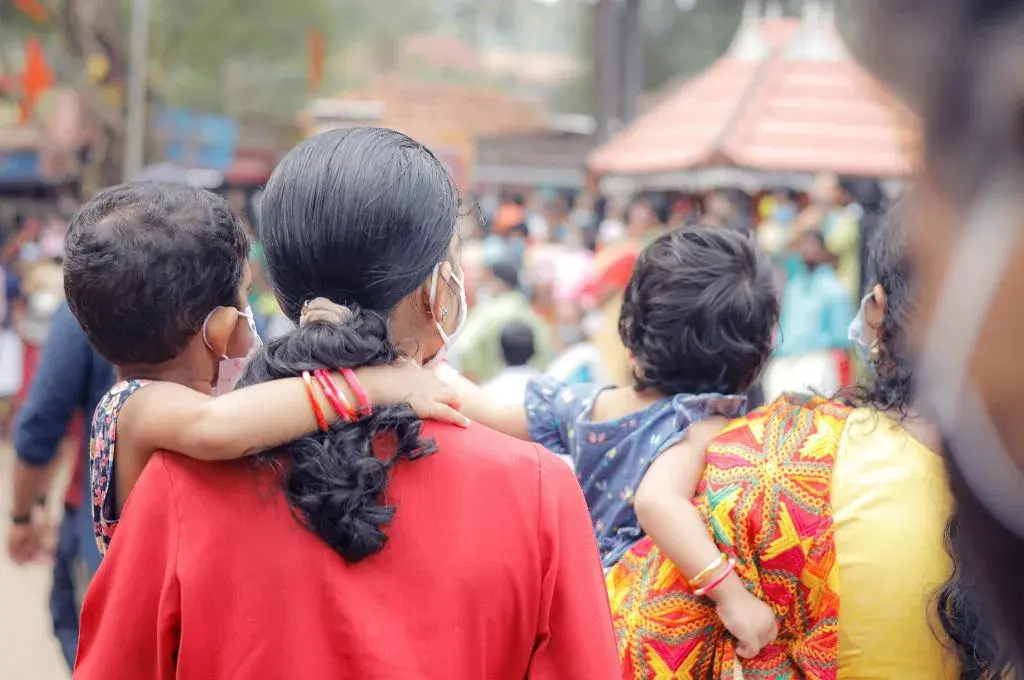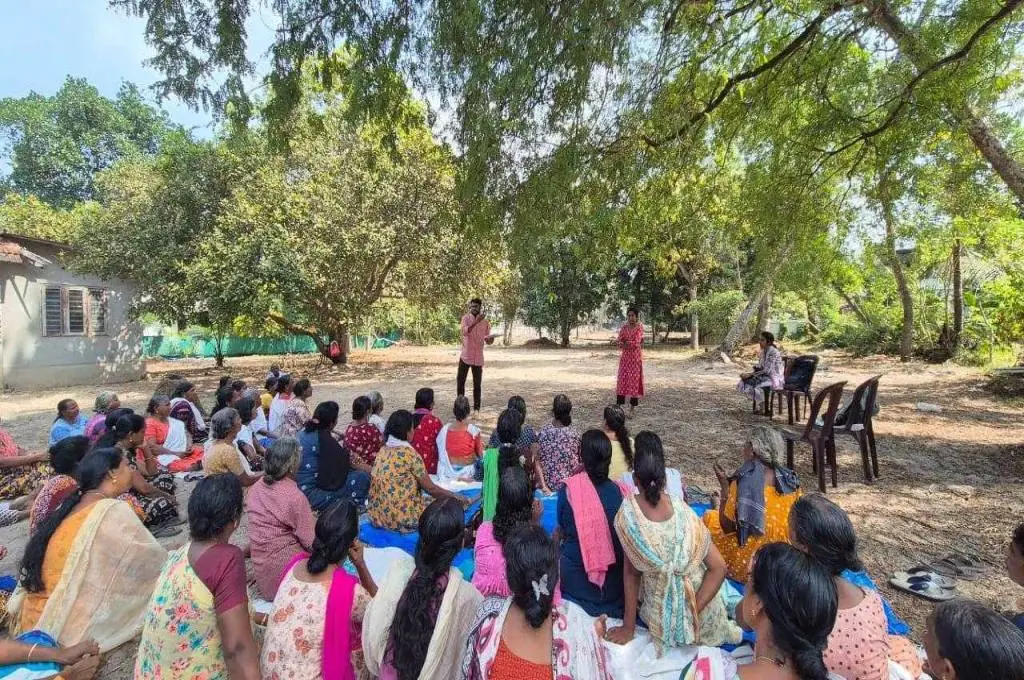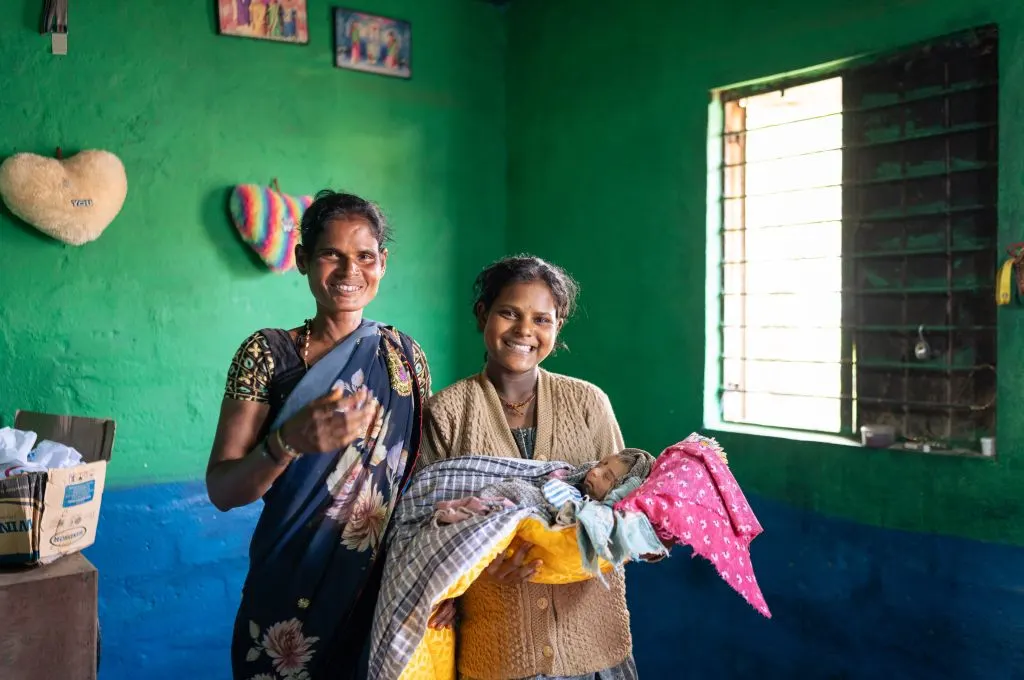Parvathy,* mother to an 18-month-old, says, “My house feels like an oven that I can’t turn off.” She resides in Chennai’s industrial belt, under a corrugated tin roof that traps the day’s heat well past midnight. In homes with poor ventilation, high pollution, or no cooling, mothers are found to face increased depression, stress, and anxiety, making it harder to care for infants.
High heat exposure increases the odds of key maternal complications: stillbirths (approximately 1.13 times higher), congenital anomalies (1.48 times higher), and gestational complications during heatwaves (1.25 times higher). Meanwhile, the toll of heat on mental well-being is clear: Studies across India link temperature spikes to rising depression and distress among older adults. In Taiwan, just a 1°C increase led to a 7 percent rise in major depressive episodes.
According to a UN report, 91 percent of deaths among preterm babies in low- and middle-income countries are attributable to air pollution, while families—especially those in homes without ventilation—reported frequent heat rashes and bouts of respiratory distress.

These patterns mirror national findings that link chronic air pollution with harmful, long-term impacts on child health. In India, about one in five new mothers experiences postpartum depression (22 percent), rising to one in four in southern states like Tamil Nadu (26 percent). Yet, access to care remains critically low, with the majority receiving no formal support. For mothers of children with disabilities, the pressures compound with access gaps, stigma, and emotional isolation layered onto the physical strain of caregiving.
In 2024–25, as part of research at Harvard Medical School, I surveyed 391 mothers across all 38 districts of Tamil Nadu to study how maternal mental health is affected by the climate crisis. I also conducted in-depth qualitative interviews with six of these mothers to better understand their lived experiences of caregiving, economic strain, and psychosocial burden under intensifying heatwaves and air pollution.

Tamil Nadu’s worsening climate burden
Tamil Nadu has been among India’s fastest-warming states, with the India Meteorological Department (IMD) recording annual maximum temperatures rising by 0.02–0.04°C per year over the last three decades. In recent years, multiple districts have crossed 42°C in summer. In Chennai, urban heat islands raise city temperatures by +3–4°C above greener areas. This worsens existing stresses, lengthens inland droughts, and increases coastal humidity.
“[The air] is like slow poison; it feels too heavy for him. I try to cover his nose with a cloth as he sleeps. But how long do I cover the air? How do I stop him from breathing this air?” says Latha,* mother of a one-year-old living near a brick kiln on the outskirts of Chennai.
Pollution and heat impact not just physical health but also the mental health of mothers. Global and Indian evidence increasingly shows that extreme heat correlates with poor outcomes for maternal mental health, including postpartum depression. Our study included mothers of neurotypical children as well as mothers caring for children with disabilities. While 65 percent of the overall sample showed mild-to-moderate depressive symptoms, the prevalence and severity were higher among mothers of children with disabilities, where stigma, intensified caregiving demands, and limited social support exacerbated the mental health burden.

Fathers act mainly as economic providers rather than caregivers. Despite their income, families still face economic strain. As one mother put it, ‘My husband’s factory job barely keeps us afloat.”
To cope in the face of crisis and limited resources, mothers develop home-grown solutions. When the informal settlements lose power, they coordinate via WhatsApp, sharing updates on government schemes relevant to them; availability of water tankers; and cooling methods. In rural Madurai, women are reviving the use of herbal cooling wraps—cotton cloth soaked in neem and turmeric water—to manage heat-induced fevers. These adaptations are low-cost and culturally embedded, and could be scaled with small material support.
However, this isn’t enough.
Tamil Nadu has the policy frameworks—what’s missing is targeted implementation for maternal-caregiving households:
1. Subsidise passive cooling technologies for high-risk households
One immediate shift that Tamil Nadu can make is targeted cooling subsidies for mothers. Cooling helps infants sleep, supports breastfeeding, and eases heat-related mental distress.
Tamil Nadu’s Heat Mitigation Strategy (2024) already endorses reflective roofing and cool surfaces for vulnerable populations. Scaling this to maternal-caregiving households could deliver rapid health benefits.
Solutions such as reflective roofing sheets (white or light-coloured coatings) can lower indoor temperatures by 2–5°C, reducing heat-related infant sleep disruptions by up to 30 percent.
Additionally, mothers use clay pot evaporative coolers and zeer pot fridges, available in rural markets. They maintain lower temperatures for water and perishables without electricity, preserving breastfeeding milk safely during power cuts.
However, there isn’t a state-sponsored mechanism that supports this simple solution. Providing these to mothers for free can help in coping with heat in low-resource settings.
2. Train ASHAs in climate caregiving and maternal mental health triage
Accredited social health activists (ASHAs) are the first point of health contact for mothers in rural areas as well as urban informal settlements. However, their training modules do not cover climate-linked caregiving risks. Since ASHAs are already overburdened with work, this shouldn’t come as an additional mandate for them. Instead, since climate-based difficulties are becoming everyday realities, their training should integrate heat-related illness recognition, safe hydration practices, indoor air quality mitigation (for example, dust filtering with damp cloth barriers), and emergency breastfeeding during heat stress.
ASHAs should also be trained to spot symptoms of postpartum depression and heat-related anxiety. Short, validated tools such as the Edinburgh Postnatal Depression Scale (EPDS) can be made available in Tamil for this.
3. Co-design local heat alert and adaptation systems with mothers
Across India, state governments are expanding their heat action plans in response to rising summer temperatures. Pioneered in Ahmedabad and now adapted in Odisha and Telangana, these plans combine early warning systems, training of health workers, and public advisories on hydration and heat safety. Tamil Nadu’s State Disaster Management Authority already issues heat alerts, and there is strong potential to build on this foundation by ensuring messages are translated into simple, actionable guidance that reaches the most vulnerable households.
Since mothers already use WhatsApp as a means of awareness, district-level groups moderated by ASHAs, where mothers receive simple, timely updates such as “avoid the sun from 11 am–3 pm” or “keep water pots shaded” or “cover roofs with wet jute sacks” can be helpful.
Community radio stations such as Kalanjiam Samuga Vanoli can broadcast heatwave care tips, hydration reminders, and maternal mental health self-check prompts in local dialects. The channel already focuses on disaster preparedness and climate resilience, especially in rural and coastal communities. A targeted approach can further benefit mothers.
As Tamil Nadu warms faster than the national average, and its urban and industrial zones grow hotter and more polluted, it is mothers—especially those in low-income households—who bear the brunt of caregiving under a crisis that cannot be ignored.
*Names changed to maintain confidentiality.
Supported by the Harvard Center for International Development and Mittal Institute, in collaboration with Harvard T H Chan School of Public Health and Harvard Medical School health experts, with no conflicts of interest.
—
Know more
- Learn how ASHAs identify the toll of climate change on maternal mental health.
- Learn why climate communication needs a health focused messaging.




